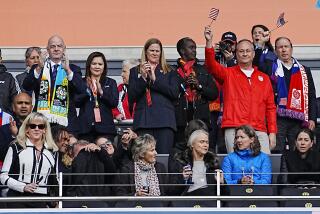Public Sector Sexism: ‘Behavior That’s Costing the City Money’ : PLATFORM
- Share via
Late last month, Los Angeles Councilwoman Laura Chick called the City Council itself a “sexist, good-old-boys work environment.” She described off-color remarks directed at her and said “dirty pictures and dirty cartoons” had been passed around during council meetings. Councilwomen Rita Walters and Ruth Galanter generally agreed with Chick. JAMES BLAIR talked with Chick and women in other municipal jobs about the atmosphere where they work. Some asked that their names not be used.
*
PAULA PETROTTA
Executive director, Los Angeles City Commission on the Status of Women
When I first came to the city 20 years ago, I worked in the administrative office. Women were not allowed to wear pants. Women were also not allowed to be budget analysts because it was felt that they were too emotional to deal with budgetary issues.
Now, clearly, we’ve done a lot better than that. But still, a lot of women who come here are frightened. The complaint, investigation and disposition is one thing. Living in the workplace day-to-day is another. Not having someone talk to you. Being ostracized. People have actually been threatened--they’re “never going to get anywhere up the ladder” if they complain. So, many times when they come [to the commission office] they’re frightened for their careers.
The difference between sexism and sexual harassment is that sexual harassment is a crime. It is a violation of the Civil Rights Act. Sexism, however, is the whole issue of women being demeaned, not being taken seriously in their professional roles. It’s comments like “You need to be back in the kitchen” or being called “Honey” or “Sugar,” and referring to women as “bitches.”
This isn’t just a matter of people who are impolite. This is behavior that is costing the city money [and not just for litigation]. What is it costing us in the loss of productivity? And the loss of good employees? About a year after I first came here, two women who had master’s degrees left the city employ because they just could not put up with the abuse.
*
SHARON K. PAPA
Chief of Metropolitan Transit Authority Police
*
I was the first female officer the transit police hired, which was interesting in and of itself simply because it is a male-dominated profession. I’ve been here for 14 years and chief for five.
As chief I watch how people react when I tell them to do something and when I make presentations in the political arena that I’m in. I know I get more questions and have to justify my actions much more than any other police chief does. I truly believe it’s because I’m a female chief. But I think it’s also my age, since I just turned 37.
For women in my department it’s a double-edged sword, the fact that there’s a female chief. If they’re able and they compete for something, they’re not going to get sidetracked just because they’re women. If all things are equal and they’re qualified, they’ll get an opportunity. The drawback to it is, the males who are resistant are always going to say, “She got that position just because our chief is a female.”
It’s the same thing when we had allegations of sexual harassment in the department and I disciplined the supervisor involved. [There was] an undercurrent of “Well, if we had a male chief that wouldn’t have happened.” But the women get a much fairer shake in our department than some other places.
*
‘MARY’ (not her real name)
Los Angeles Department of Public Works
*
I think everybody sort of stood up and applauded when we read The Times article on the councilwoman saying, “Enough is enough.” They have a good-old-boy system. It’s male only.
Where I work,they use a lot of profanity, [including comments directed specifically at women]. There was an occasion when this use of profanity went overboard and charges were brought. Nothing was ever done. It more or less put at risk the people who said something, who made the complaint.
Most [promotional] selections are not done just by interview. They’re done over a coffee break: “Do you know anything about this individual?” “Oh yeah. I heard she complained about such and such.” You see what I’m saying?
A female [DWP] engineer who struggled to be like her male counterparts ended up leaving and taking an outside position so that she could continue her career because she would never get promotional opportunities there at the city.
There’s that glass ceiling that all of us reach that you can’t go beyond unless you know the mayor or a councilperson or somebody who can pull you over. And when you hit it, they start [hassling] you. Then, if you don’t have anybody [to help or protect you] the only other direction to go is down or out.
*
LAURA CHICK
City Council member
*
It’s very important for people not to have a knee-jerk reaction in terms of dismissing or trivializing this--to say it’s just a dirty joke, doesn’t she have a sense of humor? This isn’t about dirty jokes. This is about individual behaviour that occurs way too frequently in too many places, in too many ways. It’s very widespread, it’s very entrenched and it’s very serious. But it’s not about all men--it’s not even about even some men all of the time. And, by the way, I think women need to think about it. If you start treating men in a certain way, if you think they’re all rotten and you treat them in a demeaning way, that could start to be sexism.
*
‘VICTORIA’ (not her real name)
General Services Department, City of Los Angeles
*
In the area where I work it’s been very blatant--derogatory remarks about women and their abilities and women not being given the same weight or priority in promotions. From what I can see, it has always gone on. They are attempting to bring women to the work force, but it’s not very successful.
Part of the problem is some men [who are not American-born] who have not assimilated to United States culture. In their country, they say, women do not work with them. They are not allowed to have one-on-one relationships with them in the workplace. If they do, it’s of a sexual nature. So, no matter what your education or training or experience, you just will never measure up.
Obviously there are [cultural] clashes. But there’s no support system. There’s no networking. There’s no means of communicating with other women in the work force.
*
WARREN FARRELL
Author, “The Myth of Male Power,”
*
Basically, sexism has always been a two-way street. Feminism has done a wonderful job freeing women from stereotyped sex roles even as no one has done a decent job of freeing men from stereotyped sex roles. Sexism today really exists to a greater degree in confining men to the expectation to be the wage earners, being disappointed in men when they are not earning enough.
In the work place per se, we have defined “diversity” as understanding women and understanding minorities, but we have not defined diversity in a way that would include the white male.
That has left us with women, for example, defining as harassment something that men have defined historically as hazing and did to all people who entered the workplace as part of the initiation process before they trusted those people.
More to Read
Sign up for Essential California
The most important California stories and recommendations in your inbox every morning.
You may occasionally receive promotional content from the Los Angeles Times.













